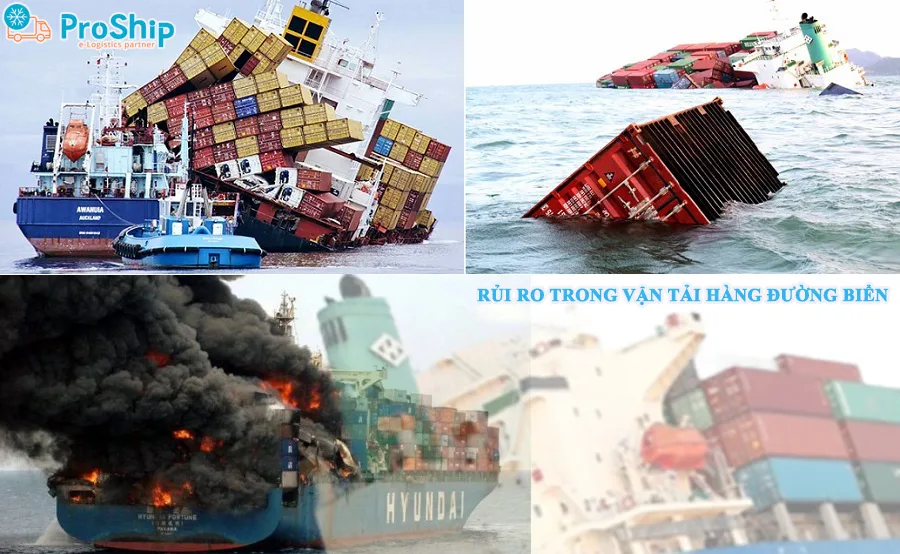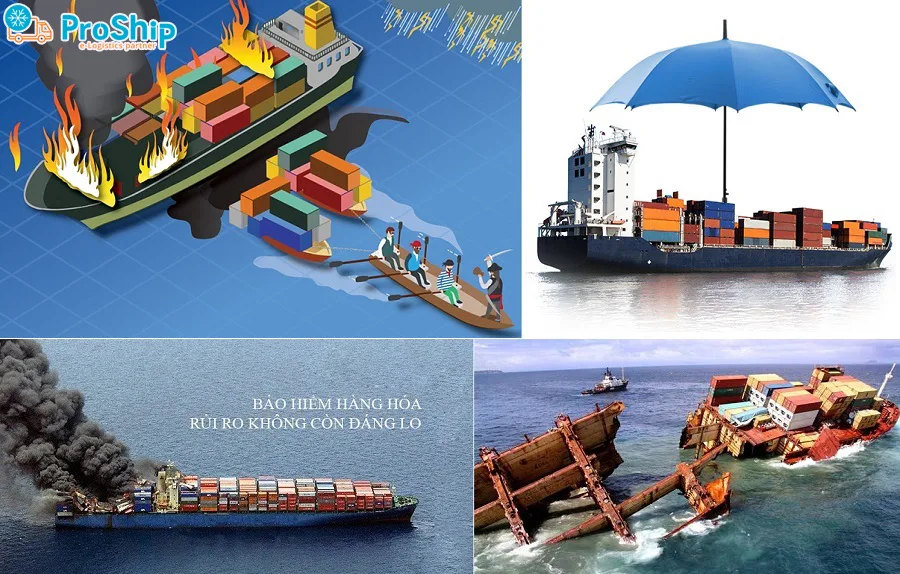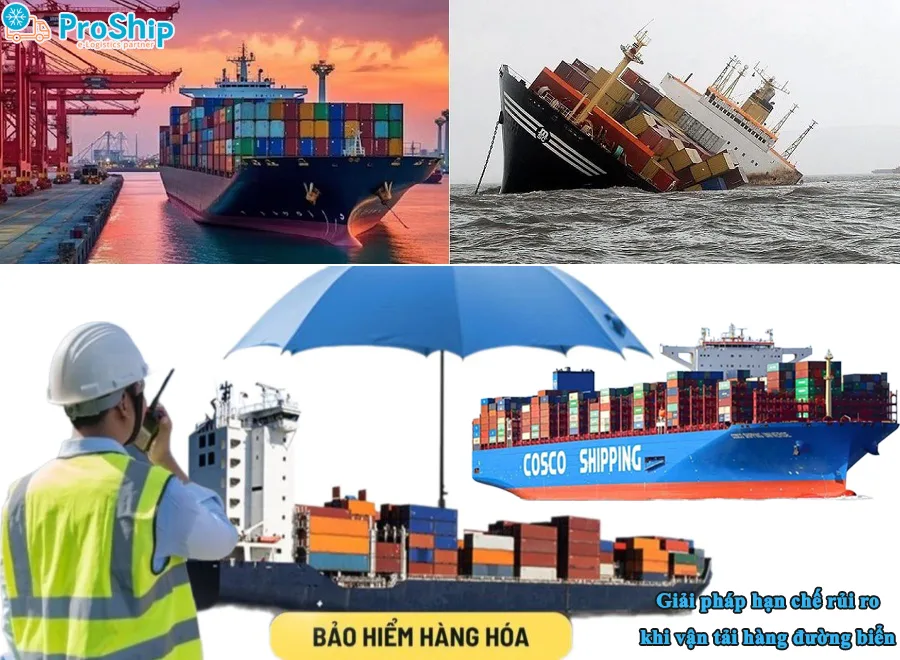x Bạn muốn chọn phương thức vận tải đường biển để tiết kiệm chi phí và chuyển được số lượng hàng lớn một chuyến?
x Bạn thắc mắc liệu có thể gặp phải những rủi ro khi vận chuyển bằng đường biển nào hay không?
x Bạn muốn biết trường hợp rủi ro trong vận tải đường biển nào sẽ được bảo hiểm bồi thường?
Proship.vn chúng tôi sẽ chỉ ra các loại rủi ro trong vận chuyển hàng hóa đường biển thường gặp nhất để các doanh nghiệp, chủ hàng,…có thể chủ động trong mọi trường hợp để từ đó sớm có những giải pháp hạn chế mọi rủi ro không đáng có trong quá trình vận tải hàng trên biển từ Cảng – Cảng.
XEM THÊM:
Rủi ro trong quá trình vận tải hàng đường biển thường gặp
Vận chuyển bằng đường biển là phương thức nhiều doanh nghiệp lựa chọn để xuất nhập khẩu để tiết kiệm chi phí, tuy nhiên vẫn có những rủi ro tai nạn không thể tránh khỏi do thiên nhiên và con người. Proship sẽ đề cập tới những rủi ro trong vận tải đường biển thường gặp:
Rủi ro từ tai nạn
Các tai nạn như mắc cạn, chìm đắm, cháy nổ hay đâm va đều gây tổn thương đến con tàu và hàng hóa bị rò rỉ, mất mát.
Khi đáy tàu chạm đất, chướng ngại vật làm tàu không thể di chuyển được gọi là mắc cạn. Trường hợp phần nổi của con tàu và toàn bộ hàng hóa nằm dưới nước làm chìm đắm. Đâm va là trường hợp tàu bị va hoặc đâm vật thể (cố định, tải động, nổi) làm hàng hóa trên tàu bị xô lệch, xếp chồng lên nhau.

Rủi ro từ thiên nhiên
Thời tiết là yếu tố quan trọng trong quá trình vận chuyển. Hiện tượng bão, sóng lớn, biển động thường gây ra tình trạng lật, nghiêng tàu, nghiêm trọng hơn là làm gãy thân tàu, dẫn đến hàng hóa bị rò rỉ, vỡ nát khi đè lên nhau.
Khi di tải trên biển, sét đánh trúng khiến hàng hóa bốc cháy, hư hại làm thất thoát số tiền lớn. Hay vỏ trái đất bị biến dạng, thay đổi mạnh, nơi dâng cao chỗ hạ thấp gây ra chấn động lớn dẫn đến hiện tượng sóng thần, hàng hóa bị mất mát.
Rủi ro từ con người
Trường hợp rủi ro từ con người ví dụ như mất cắp, mất trộm, thiếu hụt hay không giao hàng do hành động phi pháp của thuyền trưởng và thuyền viên. Từ những loại rủi ro trên sẽ tương ứng với các loại bảo hiểm tương ứng.
Rủi ro vận tải đường biển có được hưởng bảo hiểm không?
Nếu chẳng may gặp phải rủi ro trong vận chuyển hàng hóa đường biển, liệu có được nhận bảo hiểm không? Thông thường, bảo hiểm cho những trường hợp rủi ro khi vận chuyển bằng đường biển sẽ được chia như sau:
Rủi ro được bảo hiểm
Mang tính chất tự nhiên hoặc ngoài ý muốn như bão, lốc, tàu đắm, mất tích, mắc cạn, cháy nổ hoặc va chạm thì người sử dụng bảo hiểm hàng hóa sẽ được bên cung cấp dịch vụ bồi thường thiệt hại tuyệt đối.

Rủi ro được bảo hiểm riêng
Các hoạt động phá hoại từ con người (chiến tranh, nội chiến, đình công, mất cắp, cướp biển) để được bảo hiểm cần có một số điều khoản và thỏa thuận riêng của hai bên.
Trường hợp người sử dụng bảo hiểm không mua bảo hiểm cho từng loại rủi ro cụ thể, quy định trong hợp đồng vận chuyển thì những rủi ro này xem như thuộc nhóm ngoại trừ.
Rủi ro ngoại trừ
Là các rủi ro do hành động chủ ý của con người hoặc do hàng hóa có tính chất tự nhiên sẽ không được bảo hiểm.
>Xem thêm: Ký hợp đồng vận chuyển đường biển lưu ý gì?
Giải pháp hạn chế rủi ro khi vận tải hàng đường biển
Rủi ro khi vận chuyển bằng đường biển ít nhiều sẽ ảnh hưởng đến chất lượng hàng hóa nên doanh nghiệp cần tìm ra giải pháp khắc phục:
Chọn đối tác vận tải uy tín
Chọn một đối tác có uy tín, có kinh nghiệm trong lĩnh vực vận chuyển hàng hóa đường biển để đảm bảo an toàn và chất lượng dịch vụ.
Kiểm tra tình trạng tàu, hàng hóa trước khi vận tải
Điều này giúp đảm bảo tàu và hàng hóa đáp ứng được các tiêu chuẩn an toàn và được đóng gói, bốc dỡ đúng cách.
Sử dụng các thiết bị hỗ trợ đảm bảo an toàn
Sử dụng các thiết bị hỗ trợ như tàu có hệ thống cảm biến đo lường tốc độ gió, sóng, độ sâu, bình chữa cháy, thiết bị giải cứu trong trường hợp khẩn cấp để đảm bảo an toàn khi vận chuyển hàng hóa.
Đưa ra kế hoạch phòng ngừa rủi ro
Xây dựng kế hoạch phòng ngừa và ứng phó sự cố để đối phó với những rủi ro có thể xảy ra trong quá trình vận chuyển hàng hóa đường biển.
Thực hiện kiểm soát hàng hóa
Kiểm soát hàng hóa để đảm bảo chất lượng, số lượng và tránh các sai sót trong quá trình vận chuyển.

Đảm bảo an toàn thông tin
Đảm bảo thông tin về hàng hóa và tàu được bảo mật để tránh bị đánh cắp hoặc lộ ra bên ngoài.
Đào tạo, tăng cường nâng cao nhận thức cho nhân viên vận tải
Tăng cường đào tạo nhân viên vận chuyển, nâng cao nhận thức về an toàn vận tải, kỹ năng cập nhật tin tức và kinh nghiệm liên quan để họ có thể đưa ra quyết định tốt nhất cho việc vận chuyển hàng hóa đường biển.
Mua bảo hiểm cho hàng hóa
Để đảm bảo tốt nhất về quyền lợi cũng như hạn chế những tổn thất phải gánh chịu khi hàng hóa gặp rủi ro trong vận chuyển hàng hóa đường biển thì việc mua bảo hiểm cho lô hàng là cách đơn giản nhất bạn nên cân nhắc.
Quy định trong vận tải hàng đường biển
Quy định vận chuyển hàng đường biển mà Doanh nghiệp cần lưu ý:
Quy định với chủ hàng
Cung cấp thông tin chi tiết về hàng hóa, yêu cầu đặc biệt (hàng dễ vỡ/bảo quản), thông tin cá nhân (tên, địa chỉ, số điện thoại, email của người gửi và người nhận hàng); chuẩn bị giấy tờ, chứng từ làm thủ tục KBHQ.
Quy định với đơn vị vận tải
Đơn vị vận chuyển bao gồm thuyền trưởng, thợ máy, thợ điện trên các phượng tiện tham gia di chuyển tuyến giao thông đường biển phải có bằng do cơ quan giao thông vận tải cấp. Các vô tuyến điện viên được Tổng cục Bưu điện và truyền thanh trực tiếp huấn luyện và cấp bằng.
Quy định về an toàn hàng hải
Nếu xảy ra sự cố, thuyền trưởng trên phương tiện cần cố gắng báo tin cho các nhà chức trách địa phương và sau đó làm báo cáo cụ thể về tình hình tai nạn. Nếu là sự cố các tàu hàng va vào nhau, hai thuyền trưởng phải thông báo ngay và làm báo cáo với nhà chức trách có thẩm quyền nêu trên.
Quy định phương tiện vận tải
Các phương tiện phải được kiểm tra định kì theo quy định Bộ GTVT. Bên cạnh đó, phương tiện còn nhận được yêu cầu khám xét bất thường từ phía cơ quan, đơn vị trực tiếp quản lý và sử dụng hoặc thuyền trưởng.
Trên đây là những rủi ro trong vận tải đường biển mà Doanh nghiệp có thể cập nhật để sớm tìm ra giải pháp đúng đắn nhằm giảm thiểu xuống mức thấp nhất mọi rủi ro khi vận chuyển bằng đường biển. Vậy, nếu Quý khách hàng có nhu cầu vận tải hàng đường biển giá rẻ, tiết kiệm, liên hệ ngay 0909 344 247 để nhận được tư vấn trực tiếp.
